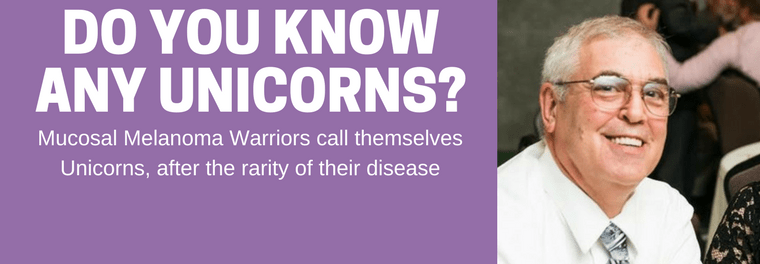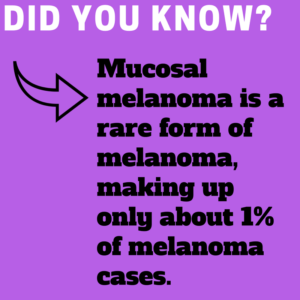Featured Survivor Story:
Jonathan Swingle, The Mucosal Melanoma Warrior


2009 was not a good year for Jonathan Swingle. Multiple nosebleeds led Jonathan to seek his doctor’s help, which led to the discovery of a tumor at the bridge of his right nostril, on the septum side. His diagnosis? Mucosal melanoma with right lung metastasis. While Jonathan was familiar with cutaneous melanoma, or melanoma of the skin, he had never heard the term mucosal melanoma.
 His lack of knowledge is not surprising, as mucosal melanoma is extremely rare, accounting for only about 1% of all melanoma cases diagnosed each year in the U.S. But he soon learned that melanocytes, which are the cells that cause pigment, can be found in mucosal areas of the body (the mouth, sinus cavities, nasal passages, vagina, anus, gallbladder, and esophagus), and therefore so can melanoma.
His lack of knowledge is not surprising, as mucosal melanoma is extremely rare, accounting for only about 1% of all melanoma cases diagnosed each year in the U.S. But he soon learned that melanocytes, which are the cells that cause pigment, can be found in mucosal areas of the body (the mouth, sinus cavities, nasal passages, vagina, anus, gallbladder, and esophagus), and therefore so can melanoma.
Unlike cutaneous melanomas, mucosal melanomas are unrelated to UV exposure, and they have different genetic etiologies. Because of the rarity of the disease, establishing diagnostic and treatment guidelines for mucosal melanoma is difficult. Early detection gives patients the best chance at long-term survival.
So how do you tackle an extremely rare disease that most have never heard of? Jonathan Swingle knows the only way is to approach it is head-on. He decided very early to make sure everyone in his life knew what the diagnosis was and how he intended to survive it. He researched incessantly. He sought multiple opinions on treatment. And he met other patients battling the same disease and began communicating with them.
One person who made an impact on Jonathan was Erica Loney, who had started a support group on Facebook because her mother was battling mucosal melanoma. Jonathan joined the group and now spends many hours online answering questions, sharing research, and supporting new patients. The group named themselves Mucosal Melanoma Warriors, but they call themselves Unicorns, after the rarity of their disease.
Today, Jonathan has survived eight years with No Evidence of Disease. He lives with his wife, Diane, and their dog, Maggie. While he spends his days working or tending his vegetable garden, each evening you will find him on Facebook sharing his knowledge, experience and most importantly, friendship with all who find their way to the Unicorns.
To learn more about mucosal melanoma, please click here.
Recent Posts

Behavioral Addiction Responsible for Excessive Indoor Tanning

Announcing AIM at Melanoma’s Official Sunscreen Partner, WearSPF

Red Hair Genetics: 5 Things You May Not Know

Surviving & Thriving: From Melanoma Survivor to Sun Safety Advocate


